Beauty becomes conscious: Clean ingredients, little or no chemicals
As consumers become more aware of ethical and sustainable parameters, brands are rushing in with innovative ingredients, techniques and packaging


Tucked away in Uttarakhand’s Himalayan foothills is the manufacturing hub of Forest Essentials. Here, amid the breathtaking scenery, the brand finds inspiration to redefine the standards of manufacturing beauty products. “A globally recognised architectural firm, Morphogenesis, which specialises in projects built on sustainable practices, was hired to design our Lodsi workshop, resulting in a building that does not use energy for heating or cooling, and produces its own electricity. This ensures it has zero carbon footprint," says Mira Kulkarni, founder and chairperson of Forest Essentials, an Indian cosmetics, skincare and perfume company with roots in ayurveda.
Inspired by local materials and indigenous techniques, naturally lit open-plan spaces allow flexibility in space function. “Our manufacturing workshop won the FuturArc Green Leadership Award in 2020, which recognises the impact of architecture that is socially and ecologically responsible in Asia," adds Kulkarni.
She believes in the coming years the Indian beauty market will evolve towards more personalised, sustainable, and wellness-driven products. As consumers become increasingly aware of ingredient transparency and ethical sourcing, the focus will shift to the integrity of the ingredients as much as the performance of the product itself.
Globally, the sustainability angle in beauty brands has been slowly but actively climbing the ladder of consumer psychology over the last two decades. “This green narrative seeped into the middle- and upper-class, albeit for different reasons. Directly and indirectly government-backed campaigns for ayurvedic cosmetics appealed to middle-class consumers by offering trusted, natural, and cost-effective alternatives. Conversely, the upper-class gravitated towards the global trend towards Parisian or Korean products for cruelty-free, chemical-free products, aligning with luxury trends and ethical consumption," says Abhik Choudhary, chief strategist and founder, Salt & Paper Consulting. “The Covid-19 pandemic, of course, also accelerated this transition, as people reconsidered their relationship with health and the environment."

To keep pace with increasing demand, the idea of sustainability is growing significantly for both established and emerging beauty brands. There is a lot of emphasis on how manufacturers wish to create and market eco-friendly products, from packaging to toxin-free formulas.
Nandita Abreo Subramanian, founder and director, Firefly Life Sciences, specialises in sustainable solutions for agriculture, landscape architecture, and environmental management. “As someone who works in sustainability, I am aware of the harm conventional beauty products cause both to the environment and to consumer health." She uses products from brands such as Forest Essentials, Kama Ayurveda, Juicy Chemistry and Sesderma. “I always look at the label before purchasing a beauty product as understanding what goes into it is critical, not only for personal use but also as an entrepreneur advocating for transparency and eco-friendly practices. Cruelty-free testing and sustainable sourcing are also practices that I align with."
According to a January 2024 report published by Ecocert, a certification organisation that recognises environmentally friendly and socially conscious practices, the ‘clean or conscious beauty’ corners at retail stores are full of innovative, disruptive brands, often with high-performance marketing. However, there is no single standard for what constitutes clean beauty. Most certifications define clean beauty products as those free from potentially harmful ingredients like parabens, formaldehyde, phthalates, and other chemicals often found in traditional beauty products (see box).
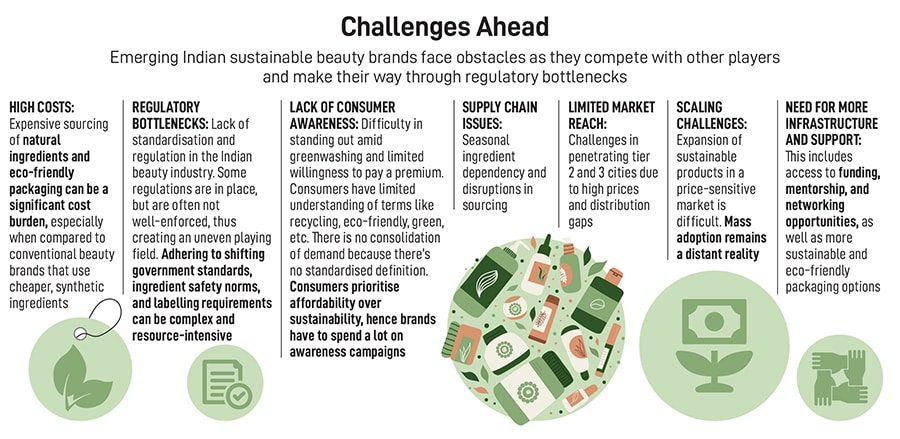
Launched in 2013, Plum is a brand that has believed in not just developing clean formulations but also delivering clinically proven results. Shankar Prasad, founder and CEO, says, “We have followed these principles in formulating our products: We are the first brand in India to be paraben-free and phthalate-free we have 100 percent vegan formulations that follow modern formulating principles ensuring that all ingredients have a score of less than 5 on the EWG [Environmental Working Group] hazard scale extensive clinical testing of formulations to ensure safety in use."
Kulkarni of Forest Essentials believes that beauty products derived from plants contain all the purifying, nutritive and balancing properties necessary to nurture the skin, and that ayurveda does not advocate chemical fertilisers or ingredients grown out of season. “All our products are unadulterated, without the use of parabens, sulphates, chemical sunscreens, and synthetic fragrances. All the preservatives we use are either natural or naturally derived, such as honey, clarified butter or ghee, pure grain alcohol and raw cane sugar." The ingredients are sourced from local, small-scale farmers, traditional artisans and rural co-operatives who use environmentally sound farming practices and have organic farms.
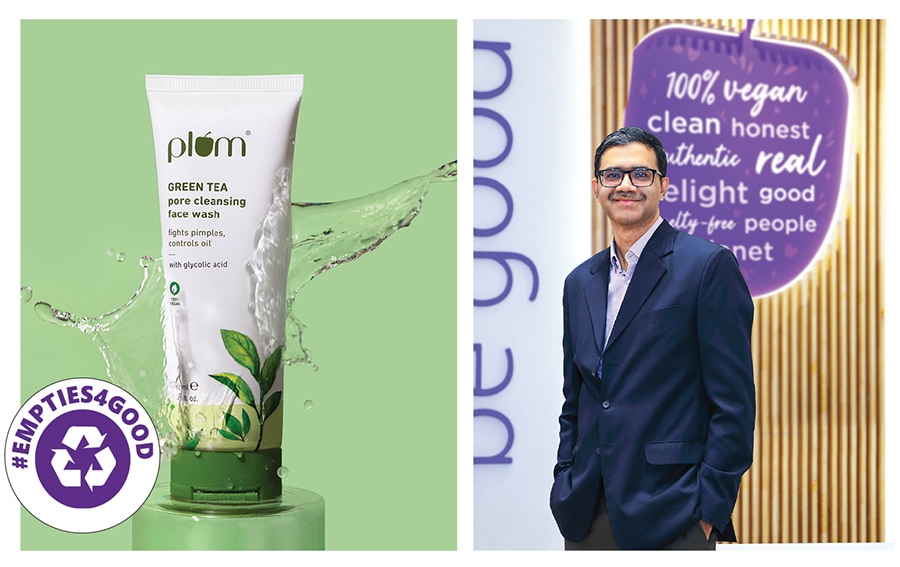 (From left) Plum’s ‘Empties4Good’ scheme gives consumers reward points in exchange for empty containers Shankar Prasad, founder and CEO of Plum
(From left) Plum’s ‘Empties4Good’ scheme gives consumers reward points in exchange for empty containers Shankar Prasad, founder and CEO of Plum
One of the best things about choosing an organic skin care product is what you don’t get in your products," says Megha Asher, co-founder of Juicy Chemistry, a bio-tech, science-first brand committed to creating formulations that are not only natural and organic, but also grounded in scientific research and testing. “We ensure our products are free of harsh chemicals, including sulphates and sulfonates, parabens, synthetic fragrances and colours, GMOs, glycols, silicones, mineral oil, petrochemicals [petroleum, paraffin], PEGs [polyethylene glycols], plastic microbeads, TEA [Triethanolamine], DEA [Diethanolamine], phthalates [DEP], ethoxylated chemicals and formaldehyde derivatives."
Instead, Juicy Chemistry uses naturally derived ingredients that are gentle on the skin and the environment. “We follow the COSMOS [COSMetic Organic and natural Standard] guidelines surrounding organic ingredients and sustainable packaging, and all our products are non-GMO verified, cruelty-free, vegan and free of any added herbicides or pesticides," she adds. The brand uses neem or turmeric and tea tree as a natural anti-bacterial and anti -fungal ingredient instead of triclosan, which is known to cause hormonal imbalances.
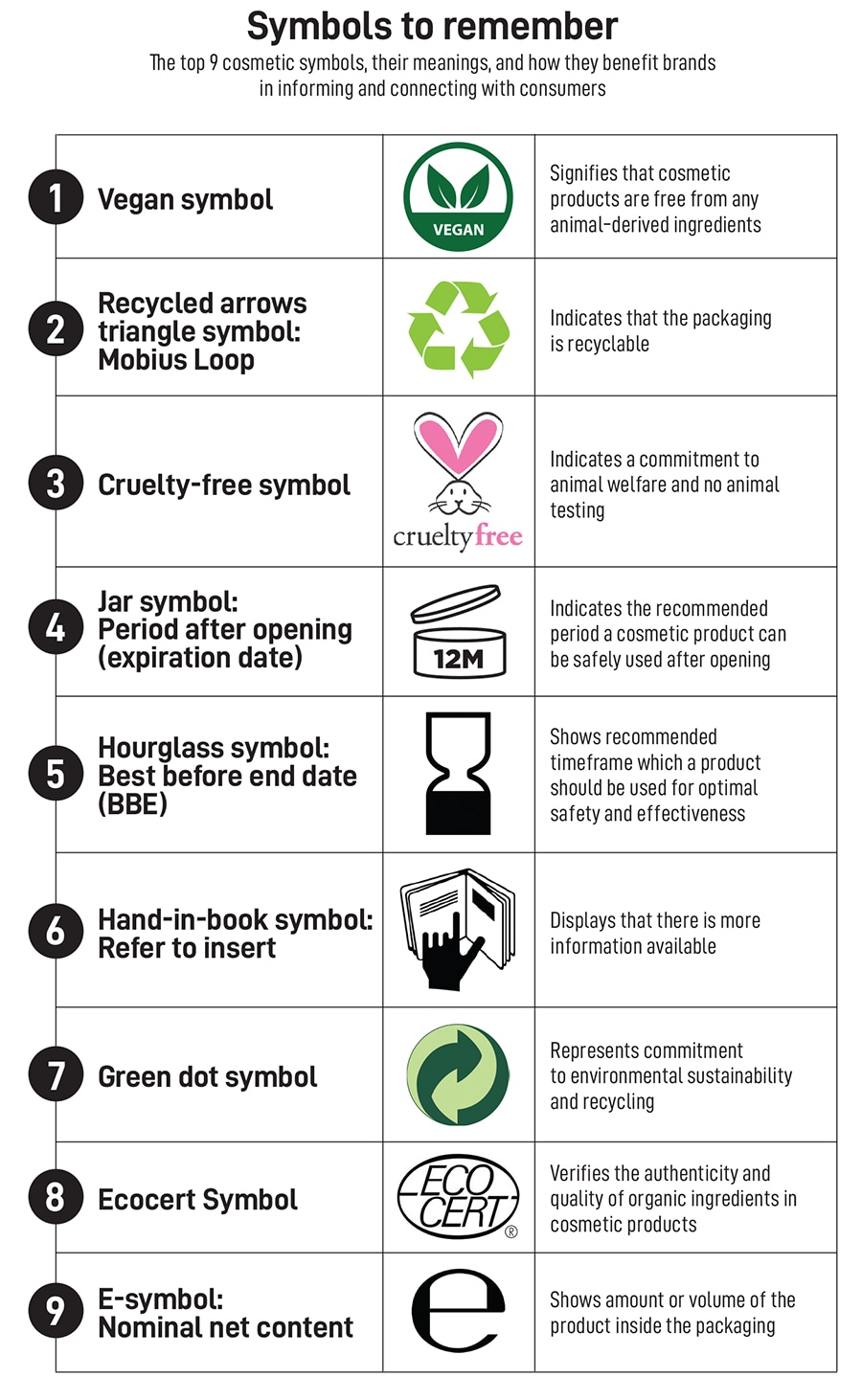 “
“
“In our hair growth oil, we use chilli as a stimulant to carry oxygen-rich blood to the scalp to deliver nutrients and pumpkin seed oil to inhibit the DHT hormone, the predominant cause for male pattern baldness," says Pritesh Asher, co-founder of Juicy Chemistry.
The co-founder of Nat Habit, Swagatika Das adds, “We use fresh, natural ingredients like milk, fruits, and pulses that minimise energy usage. With no synthetic processing and zero chemicals or preservatives, our products guarantee biodegradability, safeguarding water bodies and human health."
Das claims that most natural or organic brands use the same solvents, preservatives and fragrances as non-natural brands, while for colours, sometimes they use natural colours but sometimes not due to cost. “All our solubilising is done using natural solvents like milk, water, oil, yoghurt, aloe vera, etc. We don’t use additional colours in most cases and rely on the natural colour of the herb or fruit, such as beetroot, turmeric, neem, etc," she says. In some cases, the brand uses naturally derived colours like chlorophyll from leaves or tomato lycopene, while also using natural antimicrobial agents like neem and guduchi, or treatments like heating and de-aeration antioxidants and special packaging are used for preservation.
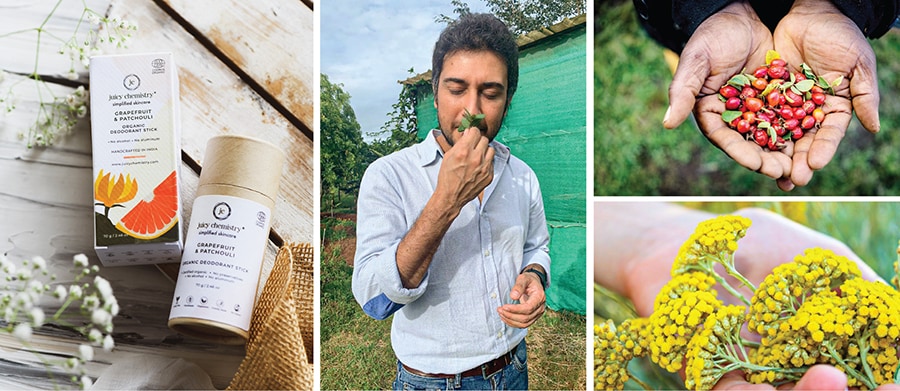 (Clockwise from left) Juicy Chemistry’s products are made with natural ingredients and packaged in eco-friendly materials co-founder Pritesh Asher Rosehip seed buds from organic farms in Lesotho Helichrysum, from organic farms in Croatia, used in their lip balm and facial oil
(Clockwise from left) Juicy Chemistry’s products are made with natural ingredients and packaged in eco-friendly materials co-founder Pritesh Asher Rosehip seed buds from organic farms in Lesotho Helichrysum, from organic farms in Croatia, used in their lip balm and facial oil
Over the last 25 years, Forest Essentials has built a strong ecosystem as far as supply of raw material and packaging are concerned. It has significantly reduced the usage of plastic by using recyclable PET and glass in its packaging. The outer packaging is done in biodegradable cartons made of Forest Stewardship Council (FSC)-certified material. The use of shrink-wrapping during stock deliveries across stores has been eliminated. “We have also introduced reusable amber and gold glass jars," Kulkarni adds.
Several brands have stopped using plastic bubble wrap and instead use recyclable air-filled paper pouches or paper cushions. Prasad of Plum says, “We have a policy of eliminating unnecessary packaging such as mono-cartons, reducing the amount of plastic by not having false bottoms or double-walled jars, almost completely avoiding the use of styrene acrylonitrile resin (SAN) or acrylonitrile butadiene styrene (ABS) thermos-plastics, which are tougher to recycle. We also incorporate a minimum of 25 percent recycled PET in shower gel bottles, eliminating shrink sleeves and moving to tamper-proof labels."
Juicy Chemistry products use Ecocert-approved packaging materials like glass, aluminium, paper, and PET-G variants that are easily compostable and recyclable. For example, its organic deodorant is packaged in a push-up tube with no mechanical moving parts, made completely from cardboard.
Tarun Sharma, co-founder & CEO of Pep Technologies Private Limited (parent company of mCaffeine and HYPHEN) says, “About 60 percent of mCaffeine and HYPHEN products are packaged in glass, whenever it is compatible with the product. When glass isn’t suitable, biodegradable material is used." The company has also developed a composition (patented in India) that speeds up the degradation process of biodegradable materials. “For the plastic we do use, we ensure it is above 50 microns in thickness, making it fully recyclable," he adds.
 Nat Habit co-founder Swagatika Das goes beyond conventional waste management practices by recycling all oils and beeswax and repurposing them into candles (right)
Nat Habit co-founder Swagatika Das goes beyond conventional waste management practices by recycling all oils and beeswax and repurposing them into candles (right)
“Energy conservation remains a key focus at Nat Habit, with motion sensor lights at our manufacturing facilities to optimise energy usage," says Das of Nat Habit. “We have set up a solar water heating system at one factory, thus reducing electricity consumption by almost 80 percent."
Sharma says, “For creams and lotions, which are the trickiest to make sustainably, we use special gel-in-oil and cream-gel technologies. These help us create cold emulsions that save over 90 percent of energy and 80 percent of manufacturing time compared to traditional methods. This process also gives our products unique textures and a great feel." All moisturisers in the HYPHEN range and the Retinol Night Cream from mCaffeine are made using this energy-saving process.
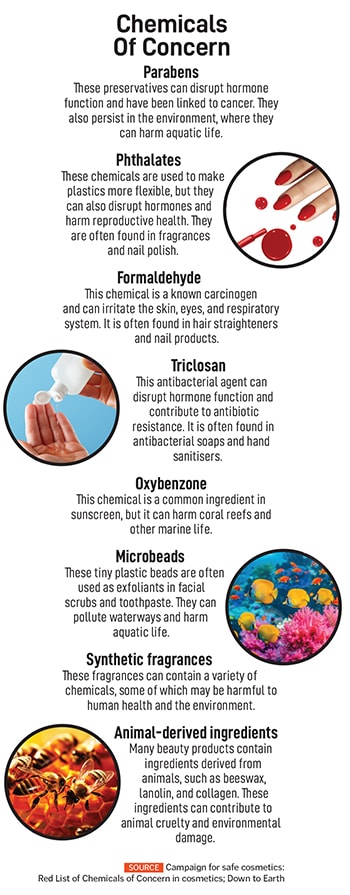 Many brands have innovative schemes and recycling options to minimise wastage and to encourage recycling and refilling. At Forest Essentials, a collection facility is set up in each store across India, where customers can drop off their empty containers. The brand has also partnered with Lakshya, an organisation for social and environmental development that segregates, repurposes and processes the recyclable PET used in its packaging into secondary applications. As the only Indian brand that is involved in the conception, formulation, manufacturing, bottling and sale of products, the entire product cycle from start to finish is thought through, thereby pioneering the concept of “farm-to-bottle".
Many brands have innovative schemes and recycling options to minimise wastage and to encourage recycling and refilling. At Forest Essentials, a collection facility is set up in each store across India, where customers can drop off their empty containers. The brand has also partnered with Lakshya, an organisation for social and environmental development that segregates, repurposes and processes the recyclable PET used in its packaging into secondary applications. As the only Indian brand that is involved in the conception, formulation, manufacturing, bottling and sale of products, the entire product cycle from start to finish is thought through, thereby pioneering the concept of “farm-to-bottle".
From 2018 Plum has been running its ‘Empties4Good’ scheme under which consumers get reward points for empty containers, which are picked up free from anywhere in India and recycled. Plum has also started a partnership with Baagh Pari, a programme by Tiger Watch to empower and uplift girls of the Mogya community of Ranthambore, where overstocked products are sent to needy children in tribal areas.
Asher says, “We encourage our customers to return their empty containers to us, and we recycle or reuse them whenever possible." In addition, a plastic-neutral programme launched in partnership with The Disposal Co allows them to recycle more plastic than they consume and become a plastic-neutral brand. “Our customers can choose to contribute ₹5 at checkout to make their orders plastic-positive. This money is shared with a certified plastic recycling programme to compensate plastic workers for their jobs." The brand believes in a ‘soil-to-soil’ approach, where the products are not only made with natural ingredients sourced from organic farms but also packaged in eco-friendly, recyclable materials that can be degraded back into soil.
Nat Habit goes beyond conventional waste management practices by recycling all oils and beeswax and repurposing them into candles. Das says, “Approximately 5 percent of the total volume of lip butter and hair oil production ends up as waste." This initiative not only minimises waste but also prevents the disposal of oils into drains, thus avoiding water pollution. “About 760 kg of oil and beeswax is 100 percent upcycled into candles for Diwali, which significantly contributes to our special festive product line-up every year," adds Das.
Unsold inventory is another factor that can cause wastage. Most sustainable brands have tackled this problem by keeping their batch sizes small, having strict distribution and supply chain controls, and aligning production with demand. Kulkarni claims, “Our warehousing is extremely efficient with supplying to our own stores since we do not have distributors. Our expiry dates are minimal, and batches are small to remain as fresh as possible." Juicy Chemistry sends products to its offline stores with a three or four-month window for turnaround of unsold products.
Although the number of sustainable brands is increasing, and finding more takers, Choudhary of Salt & Paper Consulting throws in a word of caution: “Because there are now almost 200-odd green beauty brands in the country, transparency is no longer a differentiator it’s expected. Brands need to adopt ‘radical honesty’ by going beyond just listing sustainable practices to openly discussing trade-offs, challenges, and sincere areas for improvement."
First Published: Jan 03, 2025, 14:30
Subscribe Now